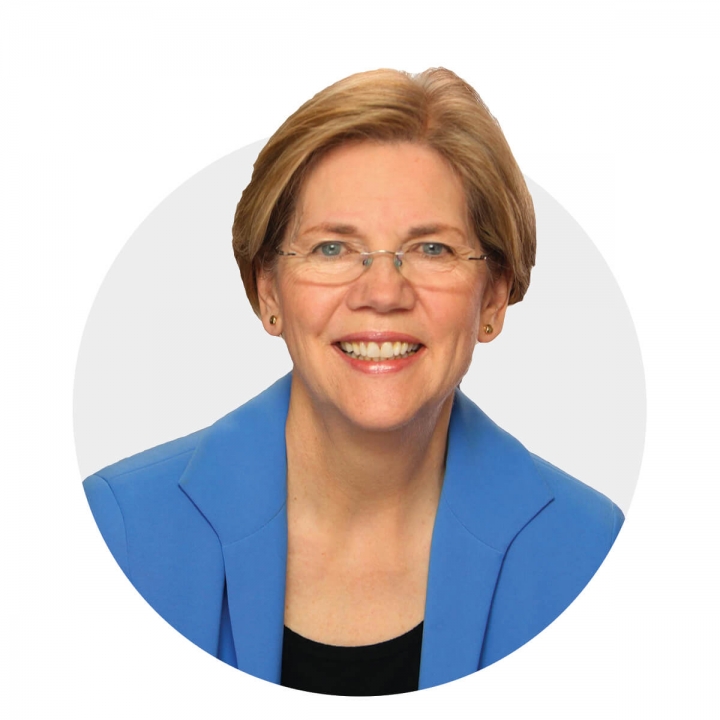Elizabeth Warren on Criminal Justice Reform
Warren would end all contracts that the Bureau of Prisons, ICE, and the U.S. Marshals have with private detention providers.
Warren would grant federal public safety funding to states and localities only if they follow the private prisons and detention facilities ban.
Warren pledges to decriminalize mental health crises through Medicare for All and increased access to mental health care services, funding co-responder initiatives that connect law enforcement to mental health care providers and experts, and piloting evidence-based crisis response efforts for people with mental illness.
Warren would Repeal the 1994 Crime Bill.
Warren would eliminate the crack and cocaine sentencing disparity.
Warren pledges to stop criminalizing homelessness, referencing laws that ban behaviors associated with homelessness like sleeping in public or living in vehicles.
Warren would reverse the Trump administration’s policy expanding pre-trial civil forfeiture at the federal level, and would restrict the use of civil forfeiture overall.
Warren would cap criminal debt collection at a percentage of income for low-income individuals, and supports states capping the percentage of municipal revenues derived from the justice system.
Warren would invest in mental and emotional health programs like peer intervention and early warning programs for law enforcement.
Warren would reverse the Jeff Sessions guidance limiting the use of consent decree investigations to investigate police departments.
Warren aims to incentivize states to empower their attorneys general to conduct oversight of police behavior.
Warren would establish federal standards for the use of force for federal law enforcement.
Warren supports limiting qualified immunity for law enforcement officials who are found to have violated the Constitution, and allowing victims to sue police departments directly for negligently hiring officers despite prior misconduct.
Warren would pass legislation to prohibit racial profiling at all levels of law enforcement.
Warren would expand federal funding for body cameras.
Warren would expand federal funding for public defenders.
Warren would provide funding for language and cultural competency training for public defenders.
Warren would establish an advisory board of people who have experienced violence and formerly incarcerated individuals.
Warren would repeal overly restrictive habeas corpus rules in order to make the appeals process easier for individuals who were wrongfully imprisoned.
Warren pledges to break the school-to-prison pipeline.
Warren promises to invest in evidence-based interruption programs, which are aimed at preventing violence and diverting criminal behavior.
Warren would invest in diversion programs for substance abuse disorder.
Warren would legalize marijuana and expunge previous convictions.
Warren would expand options that divert people with substance use disorder from incarceration into programs that provide “real” treatment.
Warren would end cash bail.
Warren would restrict fines and fees levied for individuals before adjudication.
Warren would end the practice of charging fees to incarcerated people for necessary services like phone calls, bank transfers, and health care. Warren would also prevent private companies from profiting off of individuals for incarceration and supervision, including through fees for re-entry, supervision, and probation.
Warren would develop a government database and data collection process in the Justice Department to collect law enforcement data related to fatal police shootings, ethics issues, misconduct complaints, use of force incidents, etc.
Warren would triple funding for the Office of Civil Rights to allow for increased investigations of police departments with the highest rates of police violence and whenever there is a death in custody.
Warren will implement a grant program to fund communities that establish an independent civilian oversight mechanism for their police departments.
Warren would provide incentives for cities and states to increase and improve law enforcement training in areas like implicit bias, discrimination, cultural competency, and engaging with individuals with disabilities.
Warren would end stop-and-frisk by instructing the Justice Department to withhold federal funding from law enforcement agencies that continue to employ it and similar practices.
Warren would eliminate the transfer of military-grade weapons and lethal equipment to local police via the 1033 program, would prohibit local law enforcement from buying military equipment with federal funding, and would create a buy-back program for equipment already in use.
Warren would establish a task force on digital privacy in public safety to establish guidelines for surveillance technology.
Warren would reopen and expand the DOJ’s Office for Access to Justice, which works to expand access to counsel.
Warren would “reduce or eliminate” mandatory minimum sentences.
Warren promises to rein in prosecutorial abuses, including by reducing the use of coercive plea bargaining by DOJ prosecutors at the federal level, establishing open-file discovery, and putting in place responsible standards for evidence gathering. Warren would establish a Commission on Prosecutorial Conduct to make additional recommendations for best practices and monitor adoption of those recommendations, and would create an independent prosecutorial integrity unit to hold accountable prosecutors who abuse their power.
Warren would work to reauthorize the Violence Against Women Act and would provide full funding to eliminate the rape kit backlog.
“Our criminal justice system is broken—and race is right at the center of what’s wrong. Black Americans are more likely to be arrested, wrongfully convicted, and serve longer sentences than white Americans. It’s time to end mass incarceration.”
Ending private prisons and exploitation for profit
Medium, 2019 | Elizabeth Warren
“We need significant reform in both criminal justice and in immigration, to end mass incarceration and all of the unnecessary, cruel, and punitive forms of immigration detention that have taken root in the Trump Administration.”
Ending private prisons and exploitation for profit
Medium, 2019 | Elizabeth Warren
“It’s not equal justice when a kid with an ounce of pot can get thrown in jail, while a bank executive who launders money for a drug cartel can get a bonus. It’s long past time for us to reform our system.”
Ending private prisons and exploitation for profit
Medium, 2019 | Elizabeth Warren
Read More
Ending private prisons and exploitation for profit
Medium, June 21, 2019 | Elizabeth Warren
Elizabeth Warren on Overdose Prevention Sites
Warren supports legalization of safe consumption sites.
“I’ll support evidence-based safe injection sites and needle exchanges, and expand the availability of buprenorphine to prevent overdoses.”
Sanders and Warren back legalization of injection sites for drug users
Truthout, August 29, 2019 | Mike Ludwig
“We need evidence-based solutions to combat the opioid epidemic and if the science shows that supervised injection helps reduce death and get people into treatment programs, then I will support what the science shows. When we have proven ways to reduce harm connected to HIV/AIDS – like needle exchanges to address the multiple use of needles – then I support it.”
How Would The 2020 Presidential Candidates End the HIV Epidemic?
AIDS United, September 13, 2019
Read More
Sanders and Warren back legalization of injection sites for drug users
Truthout, August 29, 2019 | Mike Ludwig
Rethinking public safety to reduce mass incarceration and strengthen communities
Medium, August 20, 2019 | Elizabeth Warren
Elizabeth Warren on HIV Getting to Zero
Warren supports Medicare for all.
Warren pledges to expand HIV research and treatment.
Warren would work to ensure comprehensive, inclusive reproductive and sexual health education and services.
Warren’s proposed Affordable Drug Manufacturing Act would allow the U.S. Department of Health and Human Services to manufacture generic drugs when no company is manufacturing a drug, or when fewer than three companies are manufacturing the drug and the price of the drug has spiked, there is a shortage of the drug, or the drug is a WHO essential medicine that fewer than three companies are manufacturing with a price that prevents patients from getting it. In her first year as president, Warren would move to publicly manufacture PrEP in order to make it more affordable.
Warren would pressure prescription drug companies to lower HIV medication prices.
Warren would overturn HIV-status criminalization and discrimination laws and regulations.
Warren would pass the Repeal Existing Polices that Encourage and Allow Legal HIV Discrimination Act, which aims to identify federal state laws and regulations that discriminate against and criminalize people living with HIV.
Warren would work to increase funding for federal HIV/AIDS programs and research, such as the Ryan White Program, including the Minority HIV/AIDS initiative, and HIV/AIDS treatment and cure research at the National Institutes of Health.
“This is appalling [in reference to a news story titled “‘Rick Scott had us on lockdown.’: how Florida said no to $70m for HIV crisis”]. We must use every tool at our disposal to end the HIV epidemic. That means funding research, reducing transmission rates, and ensuring that those living with HIV get the care that they need.”
BREAKING: 2020 Presidential Candidates Tell Us Their Plans to End HIV
HIV+Magazine, September 9, 2019 | Jacob Anderson-Minshall
“There is no single answer to ending this epidemic — we must use every tool at our disposal. That includes Medicare for All, expanding HIV research and treatment, ensuring everyone has access to PrEP and HIV testing, holding drug companies accountable and lowering drug prices, ending the opioid crisis, ensuring that community health centers receive robust funding, and reinstating our position as global leader in public health. It also means expanding economic opportunities, tackling the housing crisis, banning private prisons and exploitative contractors, overturning HIV-status criminalization and discrimination laws and regulations, and ensuring comprehensive, inclusive reproductive and sexual health education and services.”
BREAKING: 2020 Presidential Candidates Tell Us Their Plans to End HIV
HIV+Magazine, September 9, 2019 | Jacob Anderson-Minshall
Read More
BREAKING: 2020 Presidential Candidates Tell Us Their Plans to End HIV
HIV+Magazine, September 9, 2019 | Jacob Anderson-Minshall
Elizabeth Warren on Hepatitis C Treatment Access
Warren supports Medicare for all.
Warren would pressure prescription drug companies to lower medication prices.
Warren would work to ensure comprehensive, inclusive reproductive and sexual health education and services.
Warren pledges to expand HIV research and treatment.
Warren would overturn HIV-status crminalization and discrimination laws and regulations.
Read More
Battle of 1498
Rep. Khana Website, March 15, 2018 | Alexander Zaitchik
2020 Presidential Candidate HIV Questionnaire
AIDS United, 2019
Elizabeth Warren on Voting Rights Restoration
Warren supports restoration of voting rights for felons after they have completed their sentence. She does not support restoring voting rights to individuals while they are still incarcerated, but expresses a willingness to reconsider this position.
“Once someone pays their debt to society, they’re out there expected to pay taxes, expected to abide by the law, they’re expected to support themselves and their families,” she said. “I think that means they’ve got a right to vote.” “While they’re incarcerated, I think that’s something we can have more conversation about.”
Elizabeth Warren won’t say if she supports voting rights for incarcerated felons
Huffington Post, March 30, 2019 | Sam Levine and Sara Boboltz
Read More
Elizabeth Warren won’t say if she supports voting rights for incarcerated felons
Huffington Post, March 30, 2019 | Sam Levine and Sara Boboltz
Kamala Harris clarifies response on whether prisoners should be allowed to vote
SFGate, May 24, 2019 | Dianne de Guzman
Elizabeth Warren on Drug Decriminalization
Warren supports Marijuana legalization. Warren declined to publicly state a position when Massachusetts considered whether to legalize weed in 2016, but now says she voted in favor of the ballot measure and supports nationwide legalization. Warren has cited the racial disparities in marijuana arrests as a big reason to legalize the substance.
Warren is a lead sponsor of the proposed Strengthening the Tenth Amendment Through Entrusting States (STATES) Act, which would recognize the legalization of cannabis, including the existing U.S. state laws that have already legalized.
Warren is a co-sponsor of the Marijuana Justice Act, which would economically punish states that do not legalize cannabis and continue to incarcerate or arrest people for cannabis-related offenses.
“For four decades, we’ve subscribed to a “War on Drugs” theory of crime, which has criminalized addiction, ripped apart families — and largely failed to curb drug use. It starts with legalizing marijuana and erasing past convictions, and then eliminating the remaining disparity between crack and powder cocaine sentencing. And rather than incarcerating individuals with substance abuse disorders, we should expand options that divert them into programs that provide real treatment.”
Ending private prisons and exploitation for profit
Medium, June 21, 2019 | Elizabeth Warren
Read More
Presidential Candidates, the Election, and Drug Policy
Psychologytoday.com, May 7, 2019 | Adi Jaffe, Ph.D
Exclusive: Cory Booker says weed Legalization must include justice for victims of war on drugs
Vice.com, April 9, 2019 | Matt Lasko
Rethinking public safety to reduce mass incarceration and strengthen communities
Medium.com, August 20, 2019 | Elizabeth Warren
Elizabeth Warren on Substance Use Treatment Access
Warren introduced the proposed CARE Act, which would commit $100 billion over 10 years to funding addiction treatment and harm reduction programs at the local, state, and federal levels. This would include $1.1 billion for public and nonprofit entities “on the front lines, including those working with underserved populations and workers at high risk for addiction, and to support expanded and innovative service delivery of treatment, recovery, and harm reduction services.”
Warren promises to expand the availability of buprenorphine.
“Resources would be used to support the whole continuum of care, from early intervention for those at risk for addiction, to harm reduction for those struggling with addiction, to long-term support services for those in recovery. Along with addiction treatment, the CARE Act would ensure access to mental health services and help provide critical wraparound services like housing support and medical transportation for those who need them.”
My comprehensive plan to end the opioid crisis
Medium, May 8, 2019 | Elizabeth Warren
“In talking to congressional staffers over the past few years, I’ve repeatedly heard that Republicans are very resistant to spending much more money on the opioid crisis — and at least some GOP support would be needed to pass a bill.”
How the Democratic presidential candidates would combat the opioid epidemic
Vox, September 10, 2019 | Geman Lopez
Read More
My comprehensive plan to end the opioid crisis
Medium, May 8, 2019 | Elizabeth Warren
How the Democratic presidential candidates would combat the opioid epidemic
Vox, September 10, 2019 | Geman Lopez
Elizabeth Warren proposes paying for an ambitious plan to spend $100 billion fighting the opioid crisis with her new tax on the ultra-rich
Business Insider, May 8, 2019 | Eliza Relman
Elizabeth Warren’s ambitious plan to fight the opioid epidemic, explained
Vox, February 19, 2019 | German Lopez
Elizabeth Warren on Syringe Access
Warren supports syringe access and needle exchange programs.
“I’ll support evidence-based safe injection sites and needle exchanges, and expand the availability of buprenorphine to prevent overdoses.”
Ending private prisons and exploitation for profit
Medium, June 21, 2019 | Elizabeth Warren
Read More
Rethinking public safety to reduce mass incarceration and strengthen communities
Medium, August 20, 2019 | Elizabeth Warren
Elizabeth Warren on Naloxone Access
Warren says that her proposed Comprehensive Addiction Resources Emergency (CARE) Act would provide $500 million per year to expand access to overdose reversal drugs (Naloxone) and provide this life-saving medicine to states for distribution to first responders, public health departments, and the public.
Read More
Warren, Cummings, and More than 95 Colleagues in Senate and House Reintroduce Comprehensive CARE Act to Combat the Opioid and Substance Use Epidemic
Warren senate website, May 8, 2019 | Press Release







